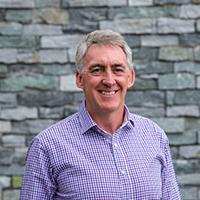Robert Claridge N.D.
Specialist Naturopath, Holistic Nutritionist, Herbalist, Homoeopath, R-System Specialist
‘Hope is being able to see that light despite all the darkness.’ Desmund Tutu
When you are unwell you can make the choice to include hope or not. Hope is a choice.
Hope can be a powerful force to help you get through any situation. There are many scientific studies that prove the power of hope. Here are just a few of them.

For instance, a study at the University of California, San Francisco (UCSF), found that hope may help you live longer and better. The study looked at more than 1,200 elderly people with heart failure and those without it, using an assessment tool called the Life Orientation Test-Revised. It found that those with high levels of hope had lower death rates over three years than those with low levels of hope. (1)
Another recent study published in Frontiers of Psychology showed hope favourably impacted Mental Illness. It stated that ‘optimistic and hopeful individuals adapt better to adversity, have lower chances of developing mental disorders, and exhibit behaviours that are healthier and related to greater satisfaction with life. ‘ (2)
A study published in the Psychosomatic Medicine found that ovarian cancer patients starting their chemotherapy with higher levels of hope showed a greater decline in their cancer marker CA125 during treatment. (3)
Every day I see patients who have been told that there is nothing that can be done to correct their presenting complaint.
Often after I have shown them the naturopathic research that disproves this assumption and sent them off to complete some strategic ‘fact finding’ homework, they will tell me that they are feeling much better. This is even before I have implemented a treatment strategy!
So what has happened? The only thing that has changed in their situation is the incorporation of hope. Hope gives them momentum in their healing journey.
I am clear that when hope is added to proven protocols it can supercharge outcomes. For this reason, I am committed to planting the seed of hope in everyone that I meet.
If you have any questions about this post or wish to make an appointment please feel free to contact our reception team.
We always look forward to helping you and planting the seed of hope.
Take care,
Rob
References
- Doris S F Yu 1, Diana T F Lee, Alice N T Kwong, David R Thompson, Jean Woo, ‘Living with chronic heart failure: a review of qualitative studies of older people.’ https://pubmed.ncbi.nlm.nih.gov/18261056/ March 2008 DOI: 10.1111/j.1365-2648.2007.04553.x
- Carlos Laranjeira and Ana Querido Feb 2022, ‘Hope and Optimism as an Opportunity to Improve the “Positive Mental Health” Demand.’ https://www.ncbi.nlm.nih.gov/pmc/articles/PMC8907849/ February 2022
- Janet S de Moor 1, Carl A de Moor, Karen Basen-Engquist, Andrzej Kudelka, Michael W Bevers, Lorenzo Cohen, ‘Optimism, distress, health-related quality of life, and change in cancer antigen 125 among patients with ovarian cancer undergoing chemotherapy.’ https://pubmed.ncbi.nlm.nih.gov/16868264/ July 2006
